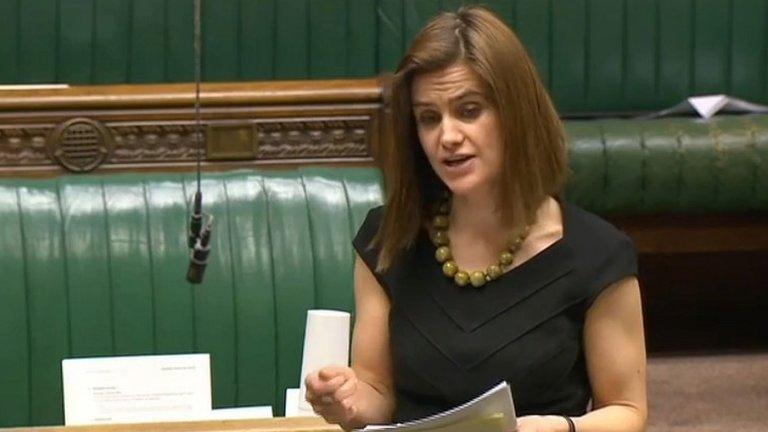Week ahead
- Published
- comments
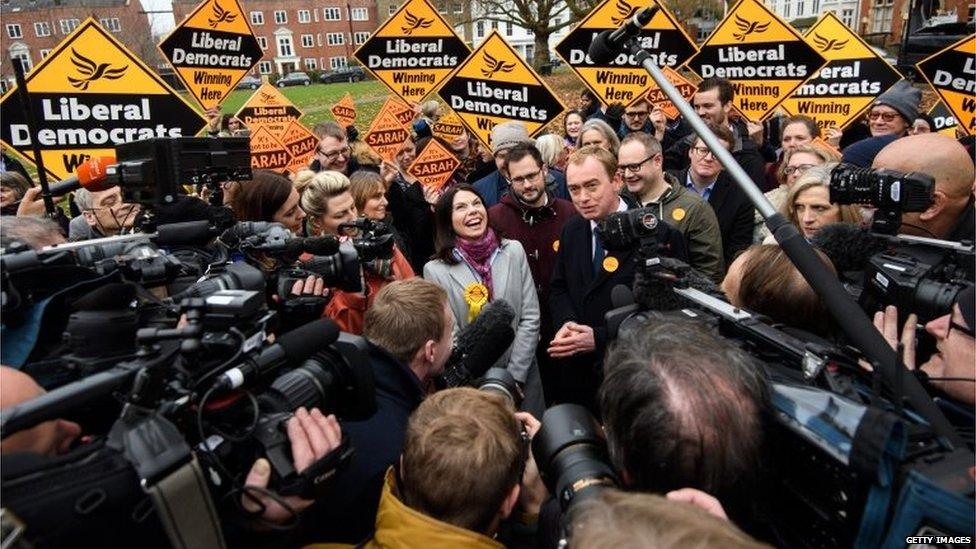
A bolt of lightning has just passed through what was becoming a "Zombie Parliament".
Just as MPs were contemplating long weeks of uncontroversial legislation, one line whips and general debates, not just until the Christmas break, but well into 2017, the voters of Richmond Park have reminded them that, in 2016, it's never quiet in politics for very long.
Let's get last night's result into perspective. The Lib Dems have received a much-needed shot in the arm, but even as the victorious Sarah Olney takes her seat, next week, the parliamentary arithmetic around Brexit has not really changed.
What might have changed a bit is the attitude of MPs - but this will cut both ways. Those who found themselves out of step with their constituents in the referendum on 23 June will have just received a pointed reminder that they now have to tread very carefully.
That means Remainers in Leave constituencies, just as much as Leavers, like Zac Goldsmith, in pro-Remain constituencies like Richmond Park. So I don't detect the early rumbles of a Brexit counter-revolution, and I don't think that emboldened Remainers will suddenly feel able to block Article 50, or whatever.
Mind you, the parliamentary arithmetic in the Commons was a little tight for the government's comfort even before Zaxit.
On Wednesday, they came closer to defeat than the Chief Whip Gavin Williamson and his pet tarantula, external would have liked, in the SNP-led debate on the state pension age for women, where the vote would have been carried had more opposition MPs turned up (more than 20 Conservative MPs failed to vote with the government, and one, Philip Hollobone voted with the opposition) but, perhaps alienated by the previous debate targeting Tony Blair, Labour mustered 165 out of 231 MPs.
So even amidst the gathering torpor, the government still has to beware of ambushes.
The scheduled business in the Commons for the coming week looks pretty unexceptional (remember that most ministerial statements and all urgent questions are not scheduled in advance) and it looks a relatively quiet week on the committee corridor. In the Lords, there could be some important votes on the Policing and Crime Bill - and some significant smoke signals about the burgeoning size if the Upper House.
Here's my rundown of the week ahead:
Monday
The Commons opens (2.30pm) with Home Office questions - with any post weekend urgent questions or ministerial statements likely to be taken immediately afterwards, at 3.30pm.
The day's main debate is on the second reading of the Children and Social Work Bill, external, which aims to promote greater stability for children in care, and better support to improve their opportunities and outcomes. It is also designed to strengthen local governance and accountability arrangements to help analyse serious cases, and to give local authorities an opportunity to test new working practices, as well as reforming the social work profession.
My select committee pick is the Communities Committee hearing (4pm). As local authorities struggle on parks - an issue that has attracted much social media attention - with minister Andrew Percy.
In the Lords (from 2.30pm) the main event is the debate on the size of the House of Lords, led by the Conservative, Lord Cormack. This seems to be intended as a show of strength by peers who want action to reduce the size of the Upper House - although in best Lords tradition of subtle influence, it won't be on a very substantive resolution saying that the size of the House should be reduced.
Lord Cormack is one of the leading figures in the Campaign for an Effective Second Chamber, external, a pressure group urging reforms that would keep the House of Lords more or less in its present form, but with fewer peers - a view which probably commands majority support on the red benches.
There's some consensus about the method by which the cull is implemented - a sort of balloon debate approach in which the party groups vote internally to decide who stays and who goes. The big point at issue is the numbers game; should the House be reshaped in line with the result of the last election, which would mean a drastic reduction in the number of Lib Dem peers? Or should the reduction be based on an average of the last three election results, which would produce more modest change?
As I write, 66 peers are down to speak, including such luminaries as the former Lord Chancellor Lord Mackay of Clashferne and the former Speaker of the Commons Baroness Boothroyd.
Tuesday
The Commons opens (11.30am) with Justice questions, followed by a Ten Minute Rule Bill on schools admission for the children of Armed Services personnel from the Conservative, Anne-Marie Trevelyan.
The main debate is on the detail of the Health Service Medical Supplies (Costs) Bill, external which aims to cut the the £15.2bn spent by the NHS in England spent on medicines.
In Westminster Hall, there are debates on household food insecurity measurement in the UK (9.30am-11am) and on tidal lagoons and UK energy strategy (2.30pm-4pm) - that is led by the former Welsh Secretary, Stephen Crabb - who has become much more visible in Westminster in recent weeks.
And there's a debate on road traffic accident prevention (4.30pm-5.30pm).
On the committee corridor, the Culture Media and Sport Committee looks at how to regulate and deal with complaints against the press, with the Hacked Off campaign; and representatives of one of the alternative models of regulation in IMPRESS, Sir Joseph Pilling, author of the external IPSO review, and David Wolfe QC, chair of the Press Recognition Panel (10.30am).
In the Lords (from 2.30pm) the main event is the second reading of Higher Education and Research Bill, external.
Wednesday
The Commons opens (11.30am) with Northern Ireland questions, followed at noon by Prime Minister's Question Time.
There's a particularly interesting Ten Minute Rule Bill, from the Conservative Ranil Jayawardena, who proposes scrapping PR elections for city mayors, the London Assembly and Police and Crime Commissioners and switching to first past the post. He also calls for elections for mayors, the London Assembly, Police and Crime Commissioners and local authorities to be held on the same day, and to allow a MPs to additionally hold any elected local government office, including Police and Crime Commissioners. A rather interesting trial balloon.
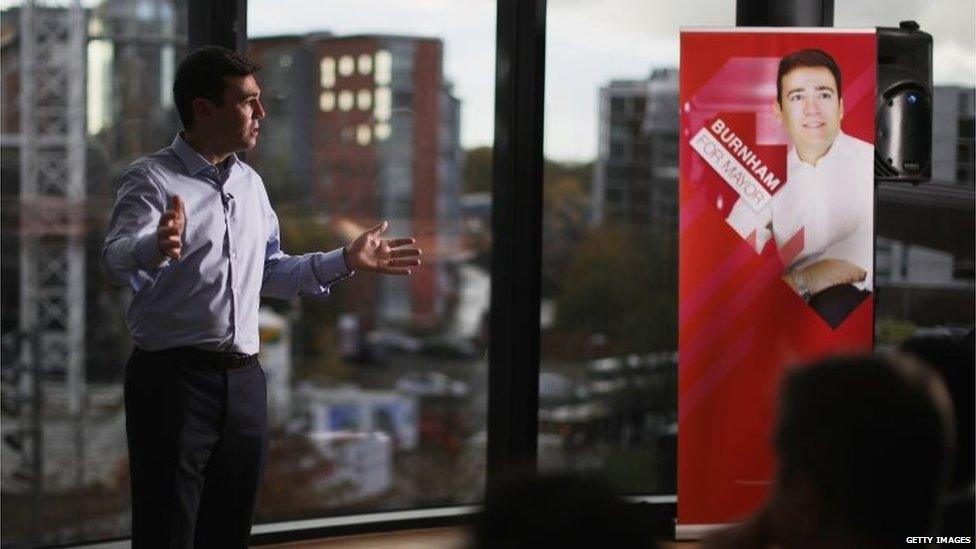
Andy Burnham has launched his campaign to become the elected mayor of Greater Manchester
The main debate will be on an Opposition motion, to be announced.
My committee pick is the Brexit Committee hearing on the UK's negotiating objectives for its withdrawal from the EU, with a rather 1970s-style lineup of the Director-General of the CBI, Carolyn Fairbairn, and Frances O'Grady, General Secretary of the TUC (9.15am).
In Westminster Hall there are debates on tree planting in the UK (9.30am-11am) and the humanitarian situation in South Sudan (2.30pm- 4pm).
In the Lords (from 3pm) the main event is the second day of report stage consideration of the Policing and Crime Bill, external - where there was a stinging defeat for the government over an amendment adding a clause to require the prime minister to set up an independent inquiry into the operation of the police complaints system and allegations of corrupt relationships between the police and newspapers.
This week, the Conservative peer and former sports minister, Lord Moynihan, has an anti-doping amendment to make it an offence for any athlete to knowingly take, anywhere in the world, a prohibited substance with the intention of enhancing his or her performance in any sports competition where there is a reward on offer, whether monetary or in terms of prestige. It would also make it an offence for anyone to encourage or assist an athlete to do so, and there are particular clauses creating new offences for medical professionals and for members of sport organising bodies, if they become involved in doping. The penalties run to up to six months imprisonment.
Other issues include a proposal from Labour's Baroness Royall to double the maximum sentence for stalking offences, to 10 years; and moves to tighten the law on blood alcohol levels from the Conservative, Baroness Berridge. Peers might, or might not, get to a proposal from the Lib Dem Lord Marks, to strengthen the law on revenge porn.
That's followed by report stage consideration of the National Citizen Service Bill, external - NCS offers courses for young people in England and Northern Ireland, mostly aged 16 and 17, which encourage them to engage with their community and develop for the future and meet people from different backgrounds, enhancing their life skills and increasing their employability. The bill tidies up the legal framework for the NCS and creates a new Trust, with the aim of making it a national institution while preserving its independent ethos.
Thursday
In the Commons (9.30am) it's questions to the Attorney General and to Justine Greening in her role as minister for women, and then the Leader of the House announces the forthcoming business in the chamber.
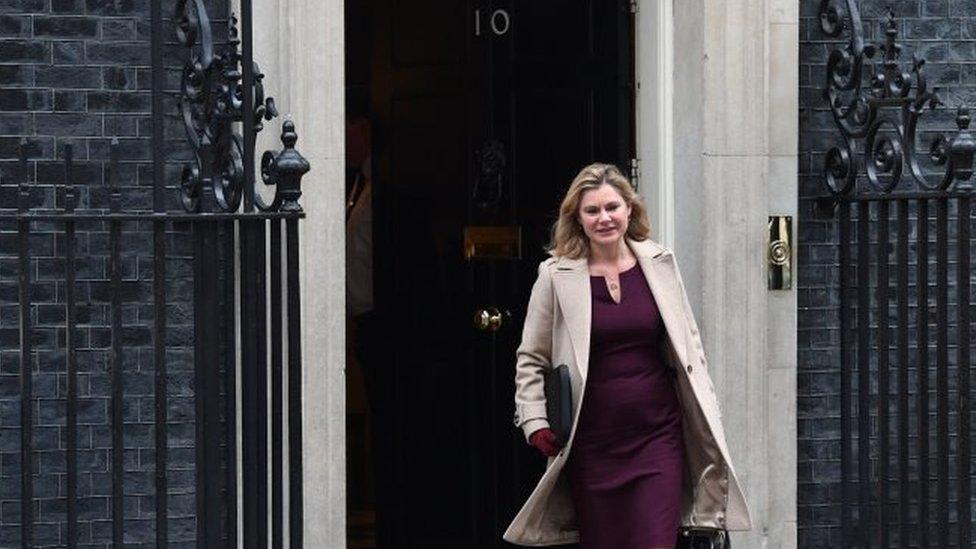
Education Secretary Justine Greening will be answering questions in her role as minister for women and equalities
The day's main debates, chosen by the Backbench Business Committee, are on the UN International Day for the Elimination of Violence against Women and the Cancer Strategy one year on.
In Westminster Hall (1.30pm) the SNP's Pete Wishart, in his guise as chair of the Scottish Affairs Committee, leads a debate on their report on Post-study work schemes, and the government response. And at 3pm, the Conservative Jeremy Lefroy leads a debate on the UK ivory trade - as a former resident of Tanzania, he's very concerned about the increased slaughter of elephants there.
In the Lords (11am) the debates are on subjects chosen by backbench Conservative peers, starting with the impact of the withdrawal from the EU on the UK's armed forces and diplomatic service, led by Lord Sterling of Plaistow. Then comes a debate on the balance between rights and responsibilities in the corporate sector, led by Lord Hodgson of Astley Abbotts, and the treatment of human rights campaigners in Iran, led by Baroness Ashfar.
Friday
The Commons isn't sitting but their Lordships meet at 10am to debate private members' bills. First up is the committee stage of the House of Lords Act 1999 (Amendment) Bill, where the Labour peer Lord Grocott continues his campaign to abolish the much-criticised system of hereditary by-elections by which the phalanx of 92 hereditary peers remaining in the Lords is topped up, with the aim of allowing the grim reaper to gradually remove them altogether.
Then there's the second reading of the Property Boundaries (Resolution of Disputes) Bill proposed by the crossbench or independent peer, the Earl of Lytton.
- Published17 June 2016
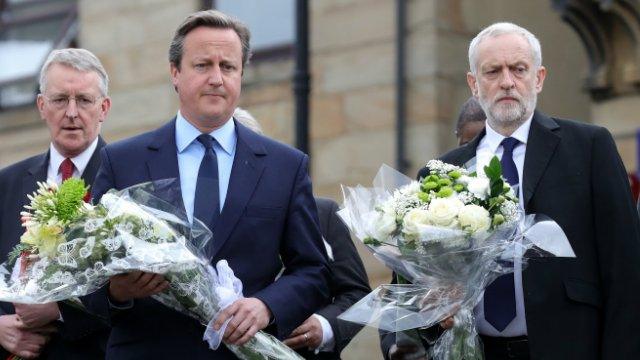
- Published17 June 2016
